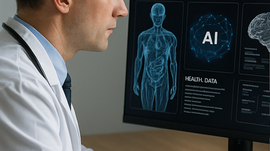Digital Health and Patient Empowerment: Trends to Watch
- IDC Contributor
- Feb 14, 2024
- 3 min read
The digital revolution in healthcare is fully underway and rapidly accelerating. After years of lagging behind other industries, medicine is finally embracing technologies that will transform the patient-physician relationship and usher in an era of true patient empowerment.
One of the biggest digital health trends is the rise of ingestible nanobiosensors - tiny smart pills that travel through the body and beam back a wealth of biological data. These sensors, made from advanced materials and packed with minuscule electronics and molecular probes, can measure metabolic activity, monitor disease biomarkers, detect environmental exposures, and even interact with our cells in real-time.

Companies like Oxypetra and Somaventures are leading the way with their respective platforms of microscopic sensors that are easily swallowed. Once inside the body, they use ultra-low power bluetooth-like signaling to report their analyses and locations. The data streams out continuously, creating an unprecedented real-time molecular read-out of your internal processes.
Having circulating nanosenors could allow people to see how their bodies respond to various foods, supplements, drugs, or environmental stressors. They can optimize their biochemical balance and nip issues like inflammation or nutritional deficiencies in the bud - all by ingesting an occasional microscopic monitor. It's true biological intelligence from the inside out.
Coupled with AI algorithms that can detect subtle patterns, these tools are like having a doctor on call 24/7 keeping tabs on your well-being. Patients can share this rich stream of personal data with their physicians, allowing for earlier detection of issues and finely-tuned treatment regimens. Need to adjust medication doses? Let the data guide the way rather than relying on periodic office visits with static measurements.
Furthermore, people can opt-in to share their de-identified data with researchers, accelerating the ability to study human health at an unprecedented scale across millions of individuals. This real-world evidence could rapidly advance our understanding of disease and identify ideal therapies.
Speaking of therapies, digital therapeutics that use apps, games and other interactive software are emerging for conditions like diabetes, neurological disorders, addiction, obesity and more. These can augment or even replace conventional drugs with fewer side effects.
Communication between patients and providers is also being reimagined thanks to telehealth, remote monitoring, and AI-assistants capable of answering questions and providing personalized guidance between clinic visits. No more waiting endlessly on hold or having difficulties getting time with your doctor.
Perhaps most empowering is the flood of medical information now available at people's fingertips via websites, apps, and voice assistants. While the reliability of sources must always be scrutinized, numerous services can now educate and equip patients and caregivers like never before.
The shift to digitized medical records and data sharing between institutions is also a game-changer, eliminating the fragmentation and lack of access that has plagued healthcare for decades. Patients will have a unified, portable and updatable record that moves with them.
Of course, there are privacy and security risks that must be addressed with all this data. And not everyone may feel comfortable with constant self-tracking or want to be a data donor. Additionally, the digital divide means not all populations will have equal access to these technologies at first.
But there's no doubt that the democratization of healthcare information, proliferation of self-monitoring tools, and cultivation of people as true partners in their care represents an extraordinary opportunity to improve human well-being globally.
Those healthcare systems and companies that fully embrace these trends and empower their patients in the digital realm will be the leaders creating the future of medicine. It's a brave new world that's only just begun.


























Comments